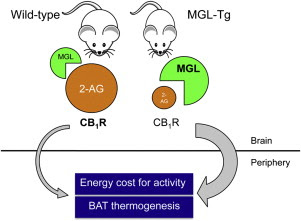It is the dream of many people that are a little too fond of eating unhealthy food: a pill that simply keeps you from getting fat. While such ideas have never been realized, a newly discovered mechanism may actually aid in getting it this work. A certain brain process can be put in overdrive which greatly increases the energy use: we can use that to get rid of all the extra energy people are taking in from eating too much. If we'll really see a diet pill on the market anytime soon remains to be seen, however.
Cannabinoids
In the brain, certain chemicals are produced that are similar to cannabinoids found in weed. These so-called endocannabinoids help regulate our metabolism. It makes us more efficient in using our energy. Normally, that would be beneficial for an organism, but in our current society we'd rather see higher energy expenditure to compensate for overeating. As getting food does not require much effort anymore, our efficient energy use now results in obesity and its associated health problems.
Blocking
Scientists from many different universities worked together in creating a mouse model with modified brain chemistry. What they created is a mouse with deactivated 2-AG, which is an endocannabinoid. Apparently, blocking this molecule in the brain resulted in body-wide changes in metabolism. 2-AG manages important biological processes by attaching itself to a specific receptor: CB-1, which then causes further downstream signalling in brain cells.
Results
They found that mice lacking 2-AG had much higher energy costs for simply keeping warm. Also, movement required more energy with their modified metabolism. Because of these modifications, the mice remained skinny, despite being subjected to a rather energy-dense diet. They were also resistant to diabetes, commonly induced by obesity. What the scientists found is that mice lacking proper control of their metabolism burn the calories stored in fat much faster, which is of course beneficial if you want to stay lean.
Outlook
Blocking 2-AG shows that extensive changes to our metabolism do not necessarily have to be complicated. Simply blocking one molecule seemed to be enough to let our body lose control of efficient energy use, which is beneficial for us humans who in our current society suffer from an overload of energy. By developing a drug towards blocking 2-AG, the diet pill could become a reality. Of course, it is not as simple as it sounds. According to the scientists, developing a blocker for this particular molecule is currently impossible for use in humans. And we would have to assess whether this mechanism found in mice works the same in humans, though that is likely. Additionally, it remains to be seen whether blocking a molecule with such an extensive metabolic effect is safe. Nevertheless, the discovery is still quite interesting and calls for more study.
Cannabinoids
In the brain, certain chemicals are produced that are similar to cannabinoids found in weed. These so-called endocannabinoids help regulate our metabolism. It makes us more efficient in using our energy. Normally, that would be beneficial for an organism, but in our current society we'd rather see higher energy expenditure to compensate for overeating. As getting food does not require much effort anymore, our efficient energy use now results in obesity and its associated health problems.
Blocking
Scientists from many different universities worked together in creating a mouse model with modified brain chemistry. What they created is a mouse with deactivated 2-AG, which is an endocannabinoid. Apparently, blocking this molecule in the brain resulted in body-wide changes in metabolism. 2-AG manages important biological processes by attaching itself to a specific receptor: CB-1, which then causes further downstream signalling in brain cells.
 |
| MGL blocks 2-AG, which reduces CB1 activity, which increases metabolism or energy expenditure. |
Results
They found that mice lacking 2-AG had much higher energy costs for simply keeping warm. Also, movement required more energy with their modified metabolism. Because of these modifications, the mice remained skinny, despite being subjected to a rather energy-dense diet. They were also resistant to diabetes, commonly induced by obesity. What the scientists found is that mice lacking proper control of their metabolism burn the calories stored in fat much faster, which is of course beneficial if you want to stay lean.
Outlook
Blocking 2-AG shows that extensive changes to our metabolism do not necessarily have to be complicated. Simply blocking one molecule seemed to be enough to let our body lose control of efficient energy use, which is beneficial for us humans who in our current society suffer from an overload of energy. By developing a drug towards blocking 2-AG, the diet pill could become a reality. Of course, it is not as simple as it sounds. According to the scientists, developing a blocker for this particular molecule is currently impossible for use in humans. And we would have to assess whether this mechanism found in mice works the same in humans, though that is likely. Additionally, it remains to be seen whether blocking a molecule with such an extensive metabolic effect is safe. Nevertheless, the discovery is still quite interesting and calls for more study.

No comments:
Post a Comment